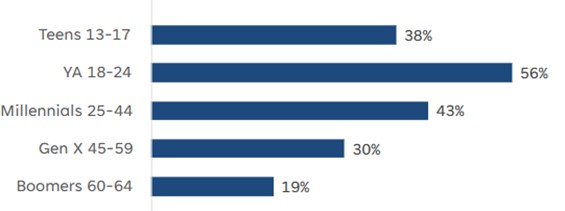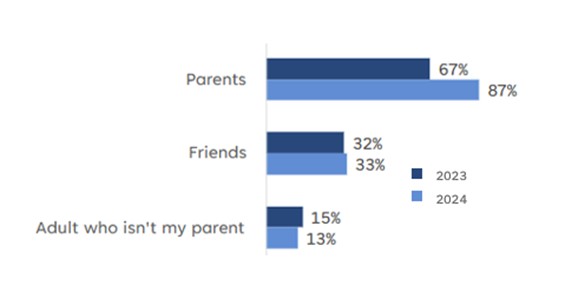
[ad_1]
With rising curiosity in rising applied sciences, together with generative AI, Safer Internet Day offers a chance for folks of all ages to have interaction and focus on on-line actions and security.
February 6, 2024, marks Safer Internet Day – an annual occasion that brings folks world wide collectively to create a safer and higher on-line atmosphere for all, particularly for youth. Microsoft has a longstanding commitment to youngster on-line security and, as we’ve not too long ago outlined, we see a necessity for persevering with analysis to assist us all maintain evolving our approaches. So, as a part of our ongoing participation in Safer Internet Day, we’re releasing the most recent findings from our annual Global Online Safety Survey, together with two new sources to assist mother and father interact with their kids: a Family Safety Toolkit and a brand new academic sport from Minecraft.
Microsoft’s annual survey, in its eighth yr, seeks to higher perceive folks’s on-line experiences to tell our strategy to digital security. We share our outcomes publicly in order that others can profit from the insights as we collectively attempt to create a safer digital ecosystem. With the launch of generative AI instruments, this yr’s survey included a selected concentrate on how folks of all ages understand the alternatives and dangers posed by this rising expertise. Our survey exhibits:
Millennials and Generation Z are driving the uptake of generative AI, with larger familiarity and early adoption resulting in larger pleasure
Young adults are probably the most lively customers and experimenters (56%). The use of AI as a sensible software excited respondents probably the most, together with for translation functions (43%), work (32%), and college (31%).

However, 87% of respondents have been fearful about at the very least one potential danger arising from generative AI, together with issues round its use for scams (71%) and deepfakes (69%). These worries steadily elevated with age – Generation Z was least involved whereas Boomers have been most involved.
Encouragingly, our survey discovered that 87% of youth are speaking to their mother and father about on-line dangers. However, larger consciousness of security options and instruments is required
Compared to our 2023 research, the outcomes present a 20-point bounce within the variety of teenagers who talked to their mother and father about on-line danger. In reality, younger individuals are extra more likely to communicate to their mother and father than their friends and pals.

While extra teenagers are speaking to their mother and father, our analysis outcomes counsel a decline in using security options. For instance, using non-public accounts, the preferred security characteristic in final yr’s analysis, fell from 64% in 2023 to 56% in 2024. Parental management use remained regular – 90% of fogeys reported utilizing at the very least one parental management, with feminine caregivers probably the most lively in participating with their kids’s on-line actions.
Download the total infographic to study extra about our survey findings here.
New on-line security sources for youth, mother and father, and educators
Enabling customers and their households to help knowledgeable decisions about their on-line exercise is much more vital with the appearance of generative AI. Importantly, our survey outcomes present that younger folks belief their mother and father and go to them for help and steering round on-line danger. To assist younger folks, educators, and households navigate the digital world, we’re releasing two new on-line security sources. We additionally not too long ago printed a toolkit for college kids and educators to assist them of their use of generative AI in studying environments.
- Microsoft Family Safety Toolkit. We understand mother and father and caregivers are busy, and that the tech panorama retains evolving. This new toolkit offers steering on leverage Microsoft’s security options and household security settings to help and improve digital parenting, plus steering for households seeking to navigate the world of generative AI collectively. We’ve additionally included hyperlinks to a collection of informational sources already made for folks, such because the Family Online Safety Institute’s How To Be A Good Digital Parent Toolkit.
- “Good Game” from Minecraft Education. “Good Game” is the latest addition in within the CyberSafe assortment of immersive Minecraft worlds designed to assist younger folks keep secure, blissful and thriving on-line. This journey teaches gamers the tasks, instruments, responses, and techniques that allow wholesome on-line interactions, collaboration, and rewarding digital experiences, whether or not these are a part of multiplayer gaming or different on-line actions. The CyberSafe collections are among the many most downloaded academic content material on the Minecraft Marketplace, having been downloaded greater than 25 million instances by gamers worldwide.
- The Classroom Toolkit: Unlocking generative AI safely and responsibly. Now obtainable for educators, the Classroom Toolkit blends narrative tales with educational info to create an immersive and efficient studying expertise for college kids aged 13-15 years. The toolkit is designed to assist provoke conversations about accountable AI practices within the classroom, such because the vital matters of content material fabrications, privateness issues, bias consciousness, and psychological wellbeing.
Microsoft stays dedicated to creating safer on-line environments for all
We acknowledge the function we play as a tech firm in defending people, notably youth, from dangerous and unlawful on-line content material and conduct. Safety by design is on the core of our merchandise, and we stay dedicated to persevering with to help and work intently with companions throughout business, authorities, and civil society to create a safer on-line world for all.
Additional sources Microsoft offers to strengthen on-line security:
Report Methodology
Microsoft has printed annual information since 2016 that surveys how folks of various ages use and look at on-line expertise. This newest consumer-based report is predicated on a survey of practically 17,000 people that was carried out this previous summer season in 17 international locations* inspecting folks’s attitudes and perceptions about on-line security instruments and interactions. Responses to on-line security differ relying on the nation. Full outcomes will be accessed here.
[adinserter block=”4″]
[ad_2]
Source link